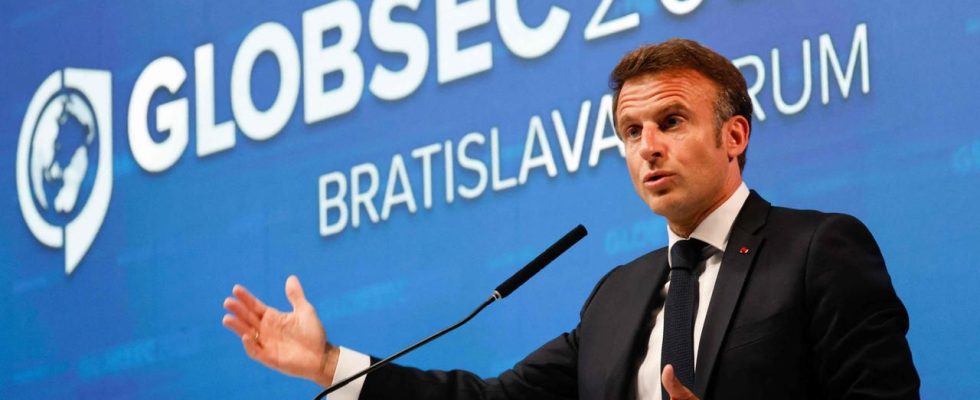So far, France’s relationship with Eastern and Central Europe has been considered cold. But whether it’s EU expansion, support for Ukraine or Russia policy – Macron suddenly strikes a completely new note.
The scene typified how France is still defining its importance on the international stage. When French Foreign Minister Catherine Colonna arrived at the NATO meeting in Oslo and explained France’s negotiating goals to the waiting journalists, she asked a control question: “You all heard the speech of the President of the Republic yesterday?”
The minister did not expect an answer, knowing the speech of French President Emmanuel Macron seemed natural to her. The fact that the group of international journalists gathered in Oslo had completely different topics on their agenda – hard for the chief diplomat from Paris to imagine.
EU enlargement “as soon as possible”
In fact, the day before in Bratislava, Macron had set some completely new accents in his foreign policy: France’s Eastern European policy is about a change of course. The place was not chosen by chance. Heads of government and foreign ministers from almost all East Central European countries were in the audience at the security conference of the GLOBSEC forum in Bratislava.
There were new tones, especially on the controversial next round of EU expansion. “As soon as possible” she should come, Macron demanded to the astonishment of his listeners. Because not so long ago, at the end of 2019, it was he who blocked accession negotiations with North Macedonia and Albania. And a fundamental reform with stricter conditions for further accession rounds demanded.
Now Macron is giving a different route. The EU should not lose any more time in its enlargement process: “To give hope and play for time would be a huge mistake!” The French President did not leave the reasons for the change of strategy in the dark. He worries that if the Western Balkan countries continue to be stalled, they may turn away from the Europeans in disappointment and seek support from Moscow or Beijing.
“Concrete security guarantees” for Ukraine
A year ago, when he was hosting the EU summit at Versailles Palace, Macron had relatively unsentimentally rejected Ukrainian President Volodymyr Zelensky’s wishes for speedy accession negotiations. It is not a question of years, but of decades before Ukraine can be expected to join the EU, said Macron. A country in the middle of a war cannot be a topic for accession talks.
Macron is now saying that even if the next NATO summit in Lithuania will not be able to decide on membership, NATO must promise Ukraine “strong and concrete security guarantees”. Macron’s foreign minister then repeated this demand from the speech almost exactly word for word at the NATO meeting in Oslo.
New sounds towards Ukraine
Whether the new line will have a concrete effect on French military aid for the country invaded by Russia remains an intriguing question. So far, Paris has ranked far behind other Europeans such as Great Britain, Germany, the Netherlands, Poland and Norway. If you add up arms deliveries, humanitarian and financial aid, less than a fifth of German aid to Ukraine comes from France.
From the point of view of the French daily “Le Monde”, the security guarantees are still one of the key statements from Macron’s speech in Bratislava – even if it is not yet clear what exactly these security guarantees should look like. And which countries would participate.
Connection of the countries west of Russia
Even after Russia invaded Ukraine, Macron stuck to the idea of a European security architecture that constructively included Russia. The Bratislava speech no longer contains such formulations, Russia is the aggressor and was catapulted from the international community by Putin.
The war also fundamentally changed Macron’s view of Eastern Europe, perhaps later than was the case in other EU capitals, but all the more fundamentally. The connection of the countries west of Russia to the EU, at least via special access to the internal market, has all become a geopolitical necessity for the French president. “We need geopolitical unity, we need to anchor the Western Balkans, Moldova and Ukraine in this Europe.”
Macron addresses strained relations with Eastern Europe
Macron knows how deeply angry some Eastern Europeans within the EU still are about France, 20 years after the legendary meanness of his predecessor Jacques Chirac. “They are either badly brought up or have no idea of the dangers of siding with America,” Chirac hurled at Poles, Balts, Czechs and Hungarians when they went to Iraq with then-US President George W. Bush -Went to war.
When those so disgraced resisted, Chirac followed suit. “You missed an opportunity to remain silent.” Since then, hardly any analysis of the sometimes difficult relations between Paris and the Eastern Europeans has done without Chirac’s attacks.
Macron addressed this in Bratislava. “We sometimes missed an opportunity to listen.” France was often perceived as arrogant, as a country that is not interested in Eastern Europe. That’s different now, he promised the region’s top politicians in the audience: “You can rely on France.”
Suddenly thanks to America
Washington must have listened with pricked ears to how much praise the French President found for the Biden administration this time. Two months ago, during his visit to China, Macron caused an uproar with the suggestion that the Europeans should not follow the Americans on the Taiwan issue.
In his speech he thanked several times for America’s support for Ukraine, which guarantees Europe’s security.
perception in France
In the French public, the President’s speech is held in lower esteem overall. The communicative goal of his appearance at the GLOBSEC meeting in Bratislava had previously been clearly described by Élysée circles: Macron would speak about the strategic importance of Eastern Europe and once again hammer down pegs for his idea of European sovereignty.
The French daily newspapers “Le Figaro” and “Libération” took up the aspect of self-criticism on. “Le Figaro” describes it, putting an end to the French arrogance that had often and for a long time bitterly upset the countries of Eastern Europe.
Even more: For Macron – who warned about a year ago that any kind of end to the war should not “humiliate” Russia – it was important to make France’s support for Ukraine clear, long-term, comprehensive and above all without any room for doubt, according to the analysis of “Libération”.
Before the important meetings of the coming months – the European Council at the end of June and the NATO summit in July – Macron apparently not only wanted to deliver the content in Bratislava, but also wanted to set the pace.


